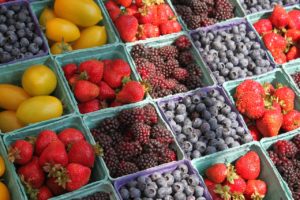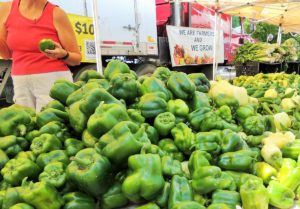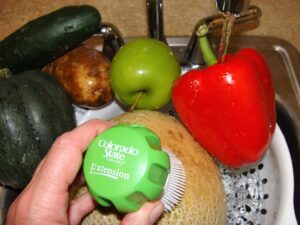 Its summertime and that means that farmers markets in your area are in full swing! Whether you are new to shopping at farmers markets or go on a regular basis, have you considered the importance of selecting the best produce for your needs? Follow these tips to increase your success and enjoyment at the market.
Its summertime and that means that farmers markets in your area are in full swing! Whether you are new to shopping at farmers markets or go on a regular basis, have you considered the importance of selecting the best produce for your needs? Follow these tips to increase your success and enjoyment at the market.
Making a Plan
First, consider what you are selecting your produce for. Are you using right away for a special recipe? Are you wanting it to last the week for a variety of meals? Or are you needing a large amount for a large gathering or food preservation project? Depending on your need, you may need produce that is ripe and ready to use, or still ripening because you won’t be consuming it right away. You can ask the farmer who is selling the product to help you pick out what you need. And did you know that most farmers would be happy to cut you a sample of produce to try? Just ask!
Selecting Produce
 Consider taking a walk through before you start buying at the market so that you know what is available. When you are ready, choose produce that has good texture, color and a fresh smell. Handle produce gently to avoid bruising and other damage. Pass on produce that is moldy, badly bruised, or shows signs of insect damage. These may allow pathogens to enter a fruit or vegetable and cause it to spoil quickly.
Consider taking a walk through before you start buying at the market so that you know what is available. When you are ready, choose produce that has good texture, color and a fresh smell. Handle produce gently to avoid bruising and other damage. Pass on produce that is moldy, badly bruised, or shows signs of insect damage. These may allow pathogens to enter a fruit or vegetable and cause it to spoil quickly.
Consider Seconds
When shopping in bulk for cooking in large batches or food preservation projects, ask your farmer for case prices or if they offer seconds of any of their produce. “Seconds (or “utilities”) are what growers may call the produce that doesn’t meet the first standard of quality or appearance. These fruits and vegetables may be slightly discolored or have blemishes”. While most food preservation recipes require the freshest and highest quality of produce for preserving, recipes that require cooking into sauces are good candidates for high quality seconds such as applesauce and tomato sauces. For more information on food preservation resources, visit Foodsmart Colorado.
Food Safety and Storage Tips
 In order to maintain the highest quality of your produce, follow these storage tips from Colorado State University
In order to maintain the highest quality of your produce, follow these storage tips from Colorado State University
- Washing produce before storing is not recommended as this may promote deterioration. Tomatoes and melons can be stored at room temperature until ripe or cut and then refrigerated.
- Always wash fresh fruits and vegetables with running water just before use.
- Store refrigerated produce in plastic bags with holes to let air circulate.
- Most fresh produce has a short shelf-life and should be used within a few days. However, apples, onions, potatoes, and winter squash can last much longer.
- Not all produce should be stored together. Apples, tomatoes and melons produce ethylene gas and should be stored away from other produce.
- Store unripened fruit at room temperature in a paper bag until ripe. Refrigerating unripened produce slows down the ripening process.
Following these practical tips can help you enjoy the many flavorful offerings of abundant seasonal produce this year.


Thanks for the information Amber. I have a question, I don’t refrigerate tomatoes nor potatoes, only if cooked or sliced. Is that ok?